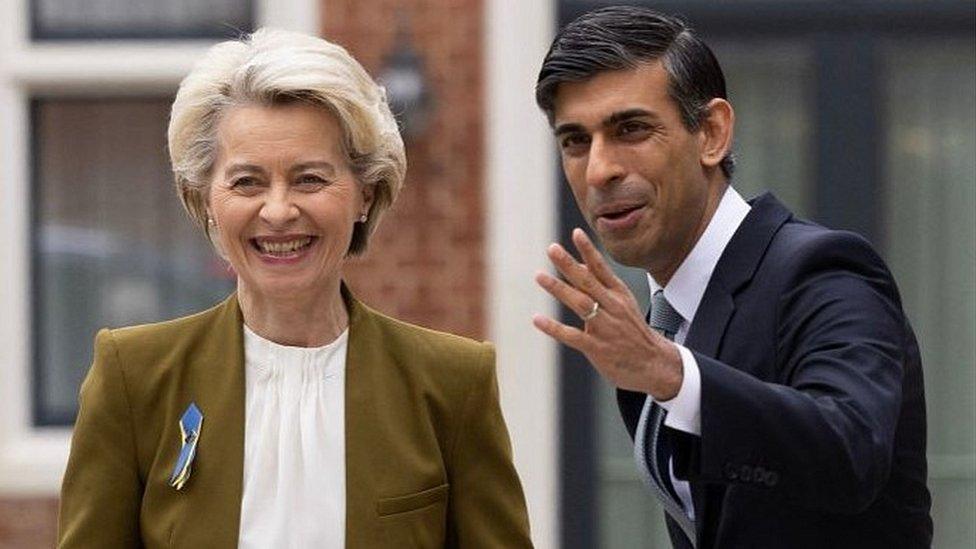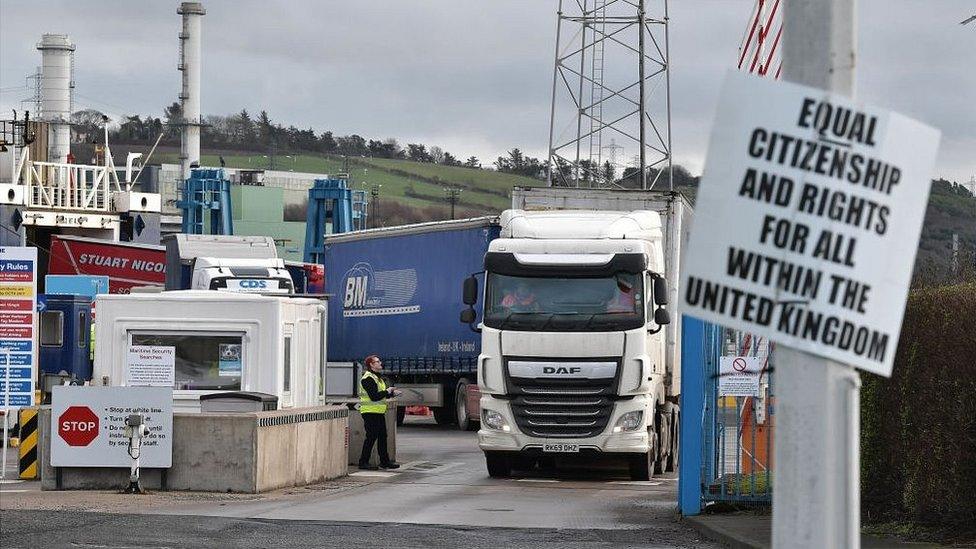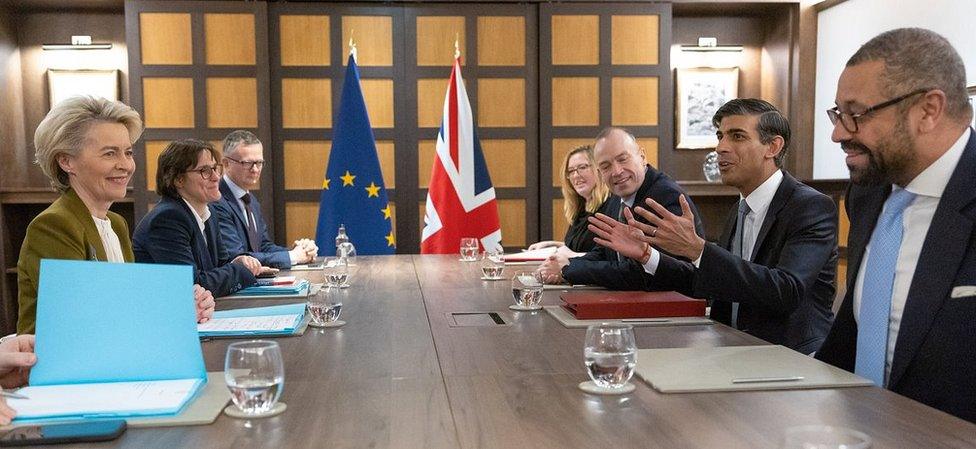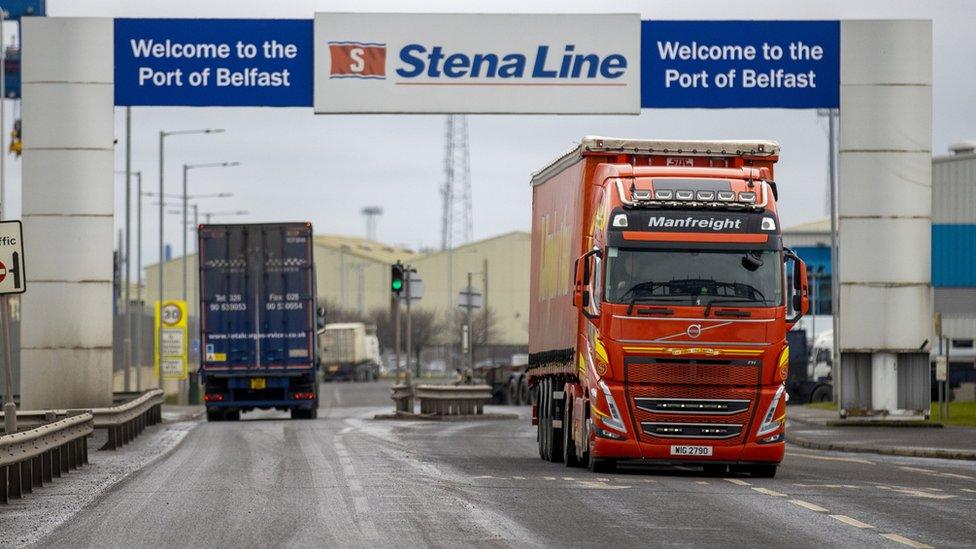Northern Ireland Brexit deal: EU-UK mood music sweeter now, but could sour
- Published

Are relations between the EU and the UK now "fundamentally changed"? And, if yes, how fragile is this "new relationship" since the two sides agreed a revised Brexit deal on Northern Ireland?
During their public unveiling of the deal on Monday, the atmosphere between the UK prime minister and the president of the European Commission was clearly warm.
And neither of them are effusive types by nature.
"Dear Rishi" was how Ursula von der Leyen addressed Rishi Sunak. He spoke enthusiastically of a new chapter in EU-UK relations.
What a contrast to the bitter bilateral Brexit wrangles of old.
But as a slightly cynical, first-hand observer of the now years-long EU-UK post-Brexit convulsions, I wondered if this mutual admiration was genuine or part of their carefully choreographed joint appearance.
After speaking to a number of diplomats on both sides of the Channel - I think it was a mixture of both. I can't name the contacts who spoke to me. They did so on the understanding our conversations were off the record.
"Rishi Sunak is the first UK prime minister we've trusted in six years (since the start of the Brexit process)," one influential EU figure told me.
You can't really claim to know Mr Sunak, I countered. He hasn't been long in the job.
But what EU politicians like about the prime minister is that he seems solutions-focused and a straight talker.
"You can see he used to be a no-nonsense banker," said one EU figure.
"Unlike his predecessors, he didn't come to Brussels to play politics - rubbishing us back home in the UK, in order to score political points," was the opinion of another.
"Sunak's a Brexiteer, we know that, but he's an outward-looking pragmatist. Not an ideologue. He saw advantages in getting a deal done (on Northern Ireland) and he got down to business with us."
Co-operating closely on Northern Ireland went a long way to healing years of broken post-Brexit trust.
European allies
In the wider picture, EU-UK relations have also been normalising ever since Russia invaded Ukraine. It's been a reminder of the values and priorities they share as they've worked together on sanctions and on aiding Kyiv militarily.
On the Northern Ireland Protocol though, each side made compromises but likes to intimate it did particularly well out of this revised deal.
The EU whispers this conviction a little more quietly, intentionally taking a backseat role. Watching, waiting and hoping Rishi Sunak manages to sell the deal back home.
Brussels doesn't want to be seen as interfering in what is now a UK domestic debate.
After the EU Commission president's exuberant show of good faith in Rishi Sunak on Monday, she disappeared on the subject. No sit-down interviews with the UK press. No proclamations from Paris or Berlin either.
But Brussels shares the prime minister's conviction that this is the right deal for all parties in Northern Ireland. For the long-term.
Neither side is now open to making extra changes. They insist all the mechanisms are in place to deal with concerns or problems if and when they arise.
What brought the EU and UK together was a shared concern for the people, businesses and communities of Northern Ireland, Brussels figures say.
"Our priorities matched: we both wanted to make life better in Northern Ireland, protect the peace process there, while also protecting our respective internal markets (the EU single market and the UK internal market)."

Post-Brexit rules on Northern Ireland border checks have been a thorny issue
Timing was also key - it's the 25th anniversary of the Good Friday/Belfast Agreement next month.
"The ticking clock focused our minds," I've been told.
US influence
EU diplomats say the US was also "very helpful in keeping up the pressure".
President Joe Biden often mentions his Irish roots. He told the UK, hungry for a post-Brexit trade deal with Washington, that if it acted unilaterally on Northern Ireland - ignoring its treaty with the EU - that would hinder its chances of reaching an accord with the US.
The EU Commission president is a keen Atlanticist, as are the majority of UK leaders.
Rishi Sunak hopes this revised deal with the EU will encourage the power-sharing government in Northern Ireland to get up and running again in time for the April anniversary, and that, in turn, will encourage Joe Biden to come over to mark the occasion.
All tantalising prospects for the UK: political stability in Northern Ireland, improved relations with the US and with the EU. The latter heralding all sorts of other goodies as Ursula von der Leyen has been keen to point out.
Restored trust facilitates new deals, she said, citing scientific research as one example. But also immigration, financial services and easing freer movement for UK musicians to perform across the EU.

All smiles at the Windsor talks on Monday
A big Brussels figure I spoke to predicted future changes in EU-UK agreements will likely centre around the wider post-Brexit trade deal, known as the TCA.
"That's where the vast amount of trade between our two sides is dealt with, and that's where, over time, we can mutually smooth out bumps in the roads - like easing checks in Calais."
All the above would be multiple coups for the quiet prime minister who entered Downing Street with his Conservative Party riven by division, facing a slumping economy and trailing in public opinion polls.
But we're not there yet. First the UK would need to approve the revised Northern Ireland agreement. If it doesn't, this sweeter mood music with the EU could quickly turn sour.
"We (Brussels) would demand the UK immediately implement our original joint agreement - signed by Boris Johnson - in full," is what you hear in EU corridors. There would be no more grace periods, accepted by Brussels up till now.
And what if the UK government then reverted to an earlier threat to unilaterally ignore that international agreement, or key parts of it? Then a looming costly trade war with the EU - still the UK's biggest trade partner - could be back on the table in a flash.
Something Rishi Sunak has been keen to avoid from the outset.
- Published27 February 2023

